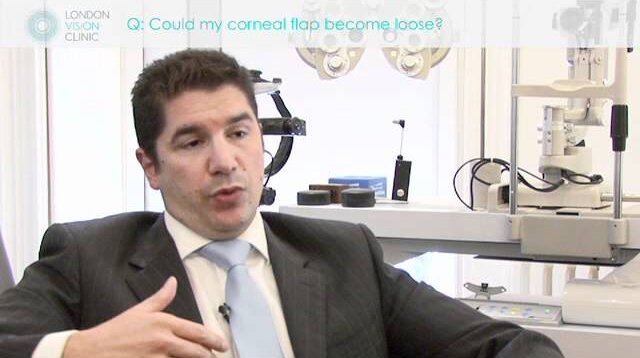What Keeps the Corneal Flap in Position After LASIK Surgery?

Having a fear of anything going near our eyes is a natural reaction – in fact, we may well have evolved that way. But for some, this fear can be enough to prevent them even considering Laser Eye Surgery. In some cases, reading more into this potentially life-changing procedure is the straw that breaks the camel’s back. After all, phrases such as “corneal flap” are far from likely to set your mind at ease.
But while this might sound a little off-putting, learning more about the LASIK procedure can help you to realise that it’s not all as bad as it sounds. So, let’s take a closer look at the basics of this procedure, including the dreaded “corneal flap”.
What is LASIK Laser Eye Surgery?
Laser Eye Surgery encompasses several refractive procedures (the most important are PRK/LASEK, ReLEx SMILE, and LASIK). LASIK – which stands for Laser-Assisted In Situ Keratomileusis – is the most commonly performed procedure. Over the last three decades, LASIK has corrected the vision of millions of people around the world. So how does it work?
All types of Laser Eye Surgery are based upon the same common principle: reshaping the cornea to adjust the way light is directed into the eye and onto the retina. By refocusing light directly onto the retina (as opposed to in front of or behind it), Laser Eye Surgery is able to correct common refractive errors, including myopia (short-sightedness), hyperopia (long-sightedness), astigmatism, and presbyopia.
But to change the shape of the cornea, the surgeon first needs to access it.
What is a “corneal flap”?
To access the corneal bed in a LASIK procedure, a high-precision femtosecond laser is used to create a “flap” on the surface of the cornea – A.K.A. the corneal flap. This flap is folded back to allow the surgeon to remove the pre-determined portion of corneal tissue with a second laser. Once the treatment is finished, the flap is put back in place.
What keeps the corneal flap in position?
At this stage, you’re probably wondering what keeps the corneal flap closed after your treatment. Will you need stitches or sutures? Well, actually, no!
The eye is an incredible organ in many ways, with one of its most impressive attributes being its rapid healing power. This healing power is so strong that the flap begins to fuse to the surrounding epithelium almost immediately. Moreover, there is almost no chance of it budging once it is put back in place – so no need for stitches or even a protective contact lens!
What Happens to the Corneal Flap After LASIK Surgery?
Now, let’s close the door for good on the issue of the corneal flap (pardon the pun). In the video below, Mr Glenn Carp explains what keeps the flap in position and provides some extra advice for patients to follow after Laser Eye Surgery.

As Mr Carp explains, almost immediately after Laser Eye Surgery the flap is returned to its original position it is held in place by an osmotic gradient force. This is linked to the balance of fluid and pressure in the eye. The cells lining the inner surface of the cornea (known as endothelial cells) pump fluid into the inner part of the eye. This creates a suction effect that holds the flap in place.
In the following days, the outer surface of the cornea begins to repopulate, sealing the edges of the flap. Finally, within a few weeks, the flap will once again be completely bonded to the underlying tissue.
Can the Corneal Flap Become Dislodged?
As Mr Carp explains in the video, the corneal flap will be healed significantly in just a matter of days. As such, it is usually extremely difficult to dislodge the flap; however, that isn’t to say it isn’t possible.
This can occur in rare cases – particularly when the patient has experienced some form of heavy trauma to the eye. This can cause the flap to move and even cause damage to other structures in the eye. Mr Carp explains more in the video below.

While this is extremely rare, it is important to follow any guidance from your surgeon during your recovery. This may include wearing any eye protection that is given to you for the recommended duration. You should also avoid rubbing or irritating your eyes as this can increase your risk of dislodging the corneal flap.
In around on in 1,500 cases, the corneal flap may be accidentally removed during the procedure. However, the removed portion of epithelium can still be put back in place following the treatment. This technique is used in LASEK.
So, to conclude, the corneal flap created in LASIK can be viewed as a temporary wormhole: it opens once and then disappears. As long as you opt for a high-quality clinic and an expert surgeon, and follow guidance throughout your recovery, you should have nothing to worry about!
Are you worried about any other aspect of Laser Eye Surgery treatment? Don’t hesitate to get in touch with one of our friendly clinic coordinators today – they’re always on hand to help! Alternatively, if you’d like to learn more about your suitability, Book a Consultation today.


